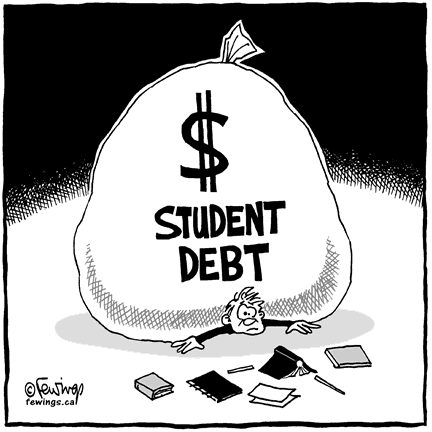A university degree is of great advantage in the job market only to the extent that everyone does not have one. - Quoted from an anonymous source.
With that statement seeming to be the gloomy reality these days, it's no wonder that students feel pressured to continue their education after receiving their undergraduate degrees. One might consider an undergraduate degree equivalent to nothing more than just a high school degree. What choice does a struggling student, eager to succeed in the real world have, after this depressing news? Driven by pressure (from parents, media, peers, own self-ambition), one enrolls them-self in graduate school to embark on another four year journey filled with all-nighters, papers and full blown stress. They find themselves desperately needing the years of education to pay off (in the form of $$$). But what if attaining this education results in decades of monthly payments to a principal that never seems to get smaller?
Now an article from Fortune magazine reported that nearly 20% of business graduate students are failing to repay their student loans! This scares the sh*t out of me, given in a few years I could easily become that statistic. The stereotype of a greedy, money-laundering, white collar criminal of a business student might be reinforced by this startling data. How are all the recent business graduate students funding their BMW's and over-priced lattes as they leave their high-rise office building? Who knew that behind the glamorous exterior resided a debt-ridden over-educated student?
Now the pressure heats up even more to find a job out of school. There are options for repaying student loans. Students pay opt for forbearance, income-based repayment or deferment. Just to get an idea of of the dismal factoids: public colleges have a repayment rate of 54%, with private schools doing only 2% better. Let's keep in mind that this information only pertains to government student loans. I would bet that an overwhelming majority have private loans, which would undoubtedly inflate the repayment rates mentioned above.
So who cares? What does this article have to do with the indifferent student that plans on repaying all payments in a timely manner? Well, much to my dismay, according to the article, a school's repayment rate affects the amount of financial aid the school will receive in future years. This means that a school's past graduates have the ability to affect how much financial aid we will receive today.
Why the lack of repayment? Seems simple enough, but the article cited several reasons. Some might open up their own business and not become profitable until years later or others find low-paying government or non-profit jobs. Still others might take a non-paying internship, or do volunteer work abroad. The most scary factor is that some fail to find jobs altogether.
Random fact: Carnegie Mellon's Tepper School of Business has the highest repayment rate for student loans clocking in at 81%.
There is a bright side to the story.
According to financial aid directors "as salaries rise and the economy recovers" the repayment statistics will improve. Those are pretty broad and general statements. I tend to take the approach of working hard and expecting high returns in the future. Work hard and everything will pay off in the end - something I try to tell myself everyday. Wishful thinking and hoping does not pay the bills or get the work done. Studies are conducted all the time, and depressing reports of lack of jobs and low savings rates will continue to invade our Twitter feeds. It is up to determination and self-motivation that will get us to to the finish lines.




